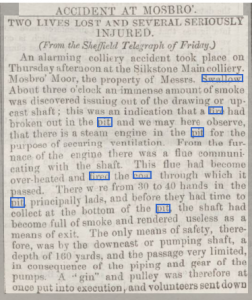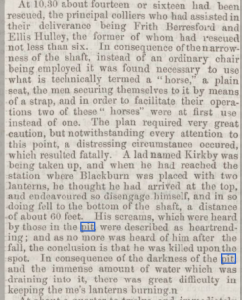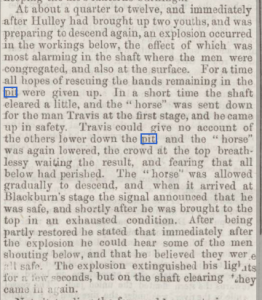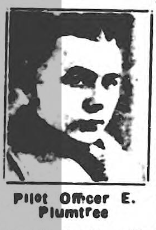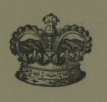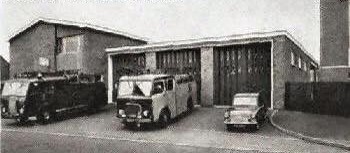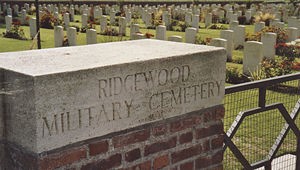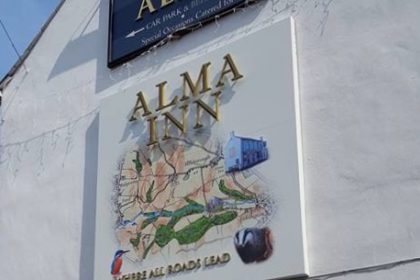An alarming colliery accident took place on Thursday afternoon at the Silkstone Main colliery. Mosbro’ Moor, the property of Messrs. Swallow. About three o’clock an immense amount of smoke was discovered issuing out of the drawing or upcast shaft; this was an indication that a fire had broken out in the pit, and we may here observe, that there is a steam engine in the pit for the purpose of securing ventilation. From the furnace of the engine there was a flue communication with the shaft. This flue had become over-heated and fired the coal through which it passed. There were from 30 to 40 hands in the pit, principally lads, and before they had time to 1 collect at the bottom of the pit, the shaft had become full of smoke and rendered usel ess as a means of exit. The only means of safety therefore, was the downcast or pumping shaft, a depth of 160 yards, and the passage very limited, in consequence of the piping and gear of the pumps. A ”gin” and pulley was therefore at once put into execution, and volunteers sent down to search for the men confined below.
The first was brought to the surface at about six o’clock, and from the information that could then be gathered, it seemed that immediately after the accident occurred the miners rushed to the bottom of the up-cast shaft, expecting to get into the chairs and at once be brought to the top, but finding the shaft and the neighbourhood of the engine on fire, they pursued their way a heading or drift to the other shaft, and there waited for assistance from above. In the meantime man named James Travis .had been placed on a stage yards from the surface to render assistance as the case required, and about yards lower down another man named John Blackburn was stationed for a similar purpose. Up to ten o’clock the draught and ventilation did not permit of such active exertions as the men were desirous of making but the wind suddenly changing, a proper course of ventilation was established, and the volunteers had a better opportunity of carrying on their work.
At 10.30 about fourteen or sixteen had been rescued, the principal colliers who had assisted in their deliverance being Frith Berresford and Ellis Hulley, the former of whom had rescued not less than six. In consequence of the narrowness of the shaft, instead of an ordinary chair being employed it was found necessary to use what is technically termed a “horse,” plain seat, the men securing themselves to it by means of a strap, and in order to facilitate their operations two of these” horses” were at first use instead of one. The plan required very great caution, but notwithstanding every attention to this point, a distressing circumstance occurred, which resulted fatally. A lad named Kirkby was being taken up, and when he had reached the station where Blackburn was placed with two lanterns, he thought he had arrived at the top, endeavoured so disengage himself, and in so doing fell to the bottom of the shaft, a distance of about 60 feet. His screams, which were heard by those in the pit, were described as heartrending; and as no more was heard of him after the fall, the conclusion is that he was killed upon the spot. In consequence of the darkness of the pit, and the immense amount of water which was draining into it, there was great difficulty in keeping the men’s lanterns burning.
At about a quarter to twelve, and immediately after Hulley had brought two youths, and was preparing to descend again, an explosion occurred in the workings below, the effect of which was most alarming in the shaft where the men were congregated, and also at the surface. For a time all hopes of rescuing the hands remaining in the pit were given up. In a short time the shaft cleared a little, and the ” horse” was sent down for the man Travis at the first stage, and he came up in safety. Travis could give no account of the others lower down the pit, and the ” horse” was again lowered, the crowd at the top breathless waiting the result, and fearing that all below had perished. The ” horse” was allowed gradually to descend, and when it arrived at Blackburn’s stage the signal announced that he was safe, and shortly after he was brought to the top in an exhausted condition. After being partly restored he stated that immediately after the explosion he could hear some of the men shouting below, and that he believed they were safe.
The explosion extinguished his lights for a few seconds, but on the shaft clearing they came in again.
Notwithstanding the favourable report Blackburn, it was still considered not safe to send any one (down, and the “horse”‘ was therefore again lowered empty, and fortunately most of the men at the bottom were able to attach themselves to it; but the work of drawing them up was one of great difficulty, and required extreme caution, as the explosion had destroyed the signal apparatus, the ropes of which were liable to become entangled with the ” horse,” and also from other obstructions which presented themselves at different points in the shaft. The last man brought up before our reporter left (making 27) was named Glassby. This was a little after one o’clock this morning. He stated that the men were still the pit, but consequence of being severely burnt by the explosion they were unable to come up without assistance, and he also added that two youths, one the lad Kirby, the other named Henry Stephenson, who was supposed to have been knocked off one of the stages, either by Kirby in his fall, or by some of the debris, were both dead, but he was not aware whether any other than those he had named remained in the mine.
© BNA – Derbyshire Times and Chesterfield Herald – Saturday 10 September 1859

